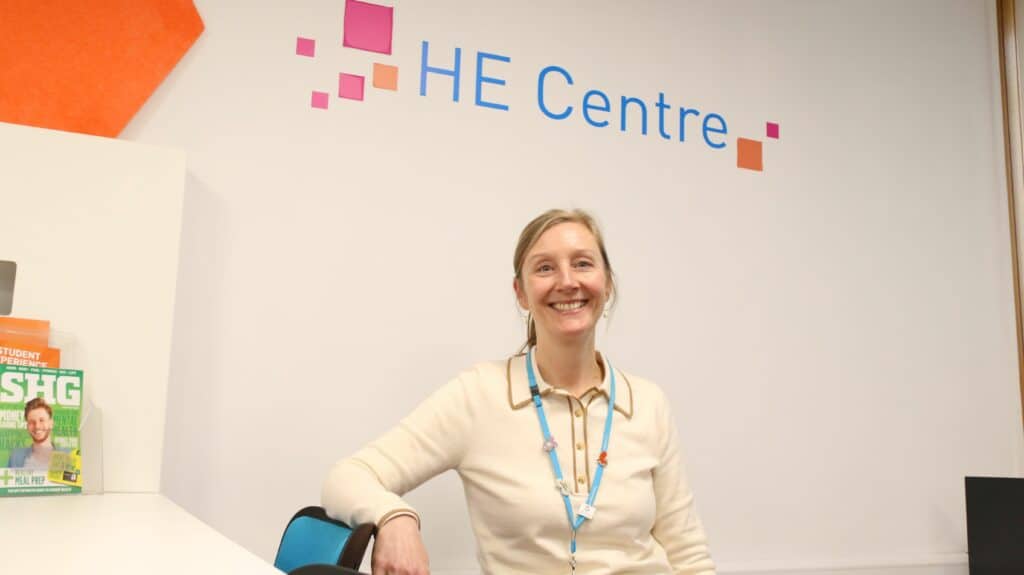After completing his PhD in Software for Manufacturing Systems, Martin went on to become a Senior Lecturer at University of South Wales then Manchester Metropolitan University before moving to Devon and teaching Computing Systems and Software Design. He has worked at the College for five years and is Programme Leader for the Higher National Certificate and Diploma courses, Access to Higher Education Diploma in Computing and the Degree Apprenticeship (BSc) in Digital Technology Solutions.
“My academic career started out on a different path. I was originally studying electrical engineering but soon realised my real interest was in IT. After getting my degree and then my PhD I decided passing on my knowledge was the next logical step so I started lecturing.
“I’ve gained a lot of educational experience over the years and have always been conscious of the importance of industry experience. For that reason I have worked with small companies throughout my career. I have arranged placements, talks and projects for students and kept in touch with the industry through working with businesses rather than within them. In my current role it is really important to have a foot in both camps and your ear to the ground; to have a clear understanding of your academic subject and also how the industry works. You have to be the master of both worlds to make the teaching relevant. Here at the College we have a really good mix of people with expertise and experience in both industry and academia.
“I taught large groups of university students before coming to the College so there was a huge learning curve in my new role. Teaching students who are younger, in smaller groups that can have challenging learning needs was a completely different experience. You have to be responsible for their learning, understand their needs and deliver your teaching in a way that caters to the way they learn. This is a hard sector but there’s fun in the challenge. When students have those light bulb moments where you see something finally click is a great feeling.
“Seeing young people achieve their potential and getting to join them on their journey and watch them grow is highly rewarding. I get to be a part of the most exciting time of their lives.
“It’s not always plain sailing as a lot of young people struggle with the decision of what to do after GCSEs and are pushed to make choices they aren’t necessarily comfortable with, but the choices we make at 16 aren’t the be all and end all. Chances are who you want to be at 16 won’t be who you want to be at 35 or 50. There are so many more opportunities now to return to education or other pathways that mean it’s never too late to change career.
“Our Access students are a prime example. After leaving school, many of them without the standard qualifications, went on to work but have now decided to come back and study. It is our job at the College to help students make the best decision and support them time and time again. There has never been a better time to return to education especially with the College now offering Degree Apprenticeships in a number of specialisms, including Software Development, Computing Consultancy, and Computer Networks. This pathway is an opportunity to try another form of study.
“Degree Apprenticeships are beneficial to students as they get the perks of learning in the work environment as well as the opportunity to experiment and conduct research in a university setting. The workplace can be complex environment in that the business has to meet clients’ needs, whilst managing a significant number of constraints. The Degree Apprenticeship allows students to learn more about this aspect of the industry, and to formulate and bring new ideas to light.
“For employers many already understand the value of a graduate, but although a graduate might come with the right level of high-end technical knowledge, it will take longer for them to get up-to-speed to be able to apply it effectively in a work setting.
“Employing a degree apprentice offers the best of both worlds. As well as the apprentice being educated to a high level, the company can choose the pathway the training takes to make sure it is tailored to meet business needs. Projects will be done in partnership with the workplace so that they are relevant and useful to the employer.
“Degree Apprenticeships offer massive potential for filling the local digital skills gap and addressing the retention issue – employees who have been guided and supported by their employer from day one are more likely to want to continue developing their careers locally.
“I see this as a valuable opportunity for both student and employer. Degree Apprenticeships are an important step in the right direction.”



